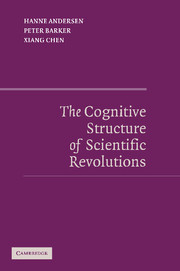Book contents
- Frontmatter
- Contents
- List of Figures
- Acknowledgments
- The Cognitive Structure of Scientific Revolutions
- 1 Revolutions in Science and Science Studies
- 2 Kuhn's Theory of Concepts
- 3 Representing Concepts by Means of Dynamic Frames
- 4 Scientific Change
- 5 Incommensurability
- 6 The Copernican Revolution
- 7 Realism, History, and Cognitive Studies of Science
- References
- Index
7 - Realism, History, and Cognitive Studies of Science
Published online by Cambridge University Press: 18 July 2009
- Frontmatter
- Contents
- List of Figures
- Acknowledgments
- The Cognitive Structure of Scientific Revolutions
- 1 Revolutions in Science and Science Studies
- 2 Kuhn's Theory of Concepts
- 3 Representing Concepts by Means of Dynamic Frames
- 4 Scientific Change
- 5 Incommensurability
- 6 The Copernican Revolution
- 7 Realism, History, and Cognitive Studies of Science
- References
- Index
Summary
In this final chapter we attempt to do three things. First, we review the results we have presented. Next we consider the implications of our position for one of the major controversies within philosophy and sociology of science, the realism debate. Finally, we consider the significance of our results for wider debates in the history, philosophy, and sociology of science.
RESULTS
Our goal throughout this book has been to recover and extend Kuhn's account of scientific change by showing that its most important features are consequences of the nature of concepts, as currently understood in cognitive psychology and cognitive science. An important subsidiary point is that Kuhn's own theory of concepts has been shown to be independently supported by work in cognitive psychology and cognitive science.
We have shown that there is a defensible distinction between normal science and revolutionary science, but that the difference between them is not a question of the historical rarity of one process versus the other. Viewed as conceptual changes both processes may occur at any time. In the case of revolutionary change, whether the result is a big revolution or small one depends on other factors – the status of the conceptual structure that changes (for example, whether or not the changes affect a fundamental item in the ontology of the field), as well as the speed and completeness with which the changes are adopted.
- Type
- Chapter
- Information
- The Cognitive Structure of Scientific Revolutions , pp. 164 - 180Publisher: Cambridge University PressPrint publication year: 2006



